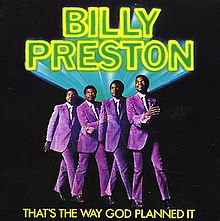The Concert for George was held at the Royal Albert Hall in London on 29 November 2002 as a memorial to George Harrison on the first anniversary of his death. The event was organised by Harrison's widow, Olivia, and his son, Dhani, and arranged under the musical direction of Eric Clapton. The profits from the event went to the Material World Charitable Foundation, an organisation founded by Harrison.
Apple Records is a British record label founded by the Beatles in 1968 as a division of Apple Corps Ltd. It was initially intended as a creative outlet for the Beatles, both as a group and individually, plus a selection of other artists including Mary Hopkin, James Taylor, Badfinger and Billy Preston. In practice, the roster had become dominated by the mid-1970s with releases of the former Beatles as solo artists. Allen Klein managed the label from 1969 to 1973, then it was managed by Neil Aspinall on behalf of the Beatles and their heirs. Aspinall retired in 2007 and was replaced by Jeff Jones. Jones stepped down on October 21st, 2024.

William Everett Preston was an American keyboardist, singer and songwriter whose work encompassed R&B, rock, soul, funk, and gospel. Preston was a top session keyboardist in the 1960s, backing Little Richard, Sam Cooke, Ray Charles, the Everly Brothers, Reverend James Cleveland, the Beatles and the Rolling Stones. He gained attention as a solo artist with hit singles "That's the Way God Planned It", the Grammy-winning "Outa-Space", "Will It Go Round in Circles", "Space Race", "Nothing from Nothing", and "With You I'm Born Again". Additionally, Preston co-wrote "You Are So Beautiful", which became a No. 5 hit for Joe Cocker.
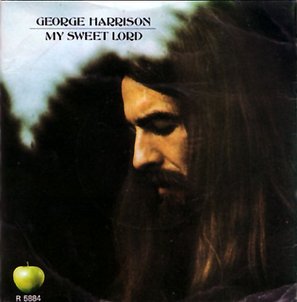
"My Sweet Lord" is a song by English musician George Harrison, released in November 1970 on his triple album All Things Must Pass. It was also released as a single, Harrison's first as a solo artist, and topped charts worldwide; it was the biggest-selling single of 1971 in the UK. In America and Britain, the song was the first number-one single by an ex-Beatle. Harrison originally gave the song to his fellow Apple Records artist Billy Preston to record; this version, which Harrison co-produced, appeared on Preston's Encouraging Words album in September 1970.

"All Things Must Pass" is a song by English rock musician George Harrison, issued in November 1970 as the title track to his triple album of the same name. Billy Preston released the song originally – as "All Things (Must) Pass" – on his Apple Records album Encouraging Words (1970) after the Beatles had rehearsed the song in January 1969 but did not include it on their Let It Be album. The composition reflects the influence of the Band's sound and communal music-making on Harrison, after he had spent time with the group in Woodstock, New York, in late 1968. In his lyrics, Harrison drew inspiration from Timothy Leary's poem "All Things Pass", a psychedelic adaptation of the Tao Te Ching.

Encouraging Words is the fifth studio album by American soul musician Billy Preston, released in September 1970 on Apple Records. It was the last of Preston's two albums for the Beatles' Apple label, after which he moved to A&M Records. The album was co-produced by George Harrison and Preston. Harrison's songs "All Things Must Pass" and "My Sweet Lord" were issued here for the first time, two months before his own recordings appeared on his triple album All Things Must Pass.

Billy Preston is the eleventh studio album by American soul musician Billy Preston, released in 1976 on A&M Records. It includes the singles "I've Got the Spirit" and "Girl", both of which were top 50 hits on Billboard's Soul Singles chart in the US. Preston recorded the album in Malibu, California in March 1976, shortly before joining the Rolling Stones on their two-month European tour.

"What Is Life" is a song by the English rock musician George Harrison from his 1970 triple album All Things Must Pass. In many countries, it was issued as the second single from the album, in February 1971, becoming a top-ten hit in the United States, Canada and elsewhere, and topping singles charts in Australia and Switzerland. In the United Kingdom, "What Is Life" appeared as the B-side to "My Sweet Lord", which was the best-selling single there of 1971. Harrison's backing musicians on the song include Eric Clapton and the entire Delaney & Bonnie and Friends band, with whom he had toured during the final months of the Beatles. Harrison co-produced the recording with Phil Spector, whose Wall of Sound production also employed a prominent string arrangement by John Barham and multiple acoustic rhythm guitars, played by Harrison's fellow Apple Records signings Badfinger.
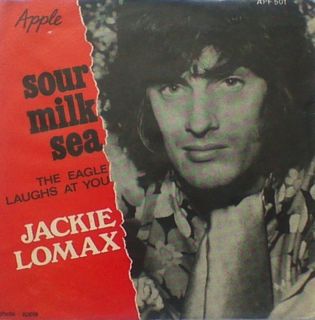
"Sour Milk Sea" is a song written by George Harrison and released by English rock singer Jackie Lomax as his debut single on the Beatles' Apple record label in August 1968. Harrison wrote the song during the Beatles' stay in Rishikesh, India and gave it to Lomax to help launch Apple Records. Lomax's recording is a rarity among non-Beatles songs since it features three members of the band – Harrison, who also produced the track, Ringo Starr and Paul McCartney. Performed in the hard rock style, the song also includes musical contributions from Eric Clapton and session pianist Nicky Hopkins. It was the first of many Harrison productions for artists signed to the Beatles' record label.

A Sideman's Journey is the first solo album by German musician and artist Klaus Voormann, released in July 2009. Voormann is best known as the creator of the cover art for The Beatles' album Revolver as well as for being a much-in-demand session musician during the 1970s. He played bass on a large number of well-known albums by ex-Beatles John Lennon, George Harrison and Ringo Starr − including All Things Must Pass, Imagine and The Concert for Bangladesh − and by artists such as Harry Nilsson, Doris Troy, Lou Reed, Gary Wright, Carly Simon and Randy Newman. Before then, Voormann had been a member of the 1960s pop group Manfred Mann. A Sideman's Journey is notable for including performances by Paul McCartney, Ringo Starr and Yusuf Islam, among others.
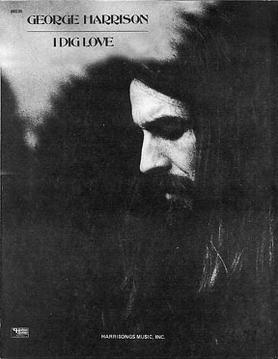
"I Dig Love" is a song by English rock musician George Harrison from his 1970 triple album All Things Must Pass. A paean to free love, it marks a departure from the more profound, spiritually oriented subject matter of much of that album. Musically, the song reflects Harrison's early experimentation with slide guitar, a technique that he was introduced to while touring with Delaney & Bonnie and Friends in December 1969.

"Māya Love" is a song by English musician George Harrison, released on his 1974 album Dark Horse. The song originated as a slide guitar tune, to which Harrison later added lyrics relating to the illusory nature of love – maya being a Sanskrit term for "illusion", or "that which is not". Harrison's biographers consider the lyrical theme to be reflective of his failed marriage to Pattie Boyd, who left him for his friend Eric Clapton shortly before the words were written. Harrison recorded the song at his home, Friar Park, on the eve of his North American tour with Ravi Shankar, which took place in November and December 1974. The recording features Harrison's slide guitar extensively and contributions from four musicians who formed the nucleus of his tour band: Billy Preston, Tom Scott, Willie Weeks and Andy Newmark. Reviewers note the track as an example of its parent album's more diverse musical genres, namely funk and rhythm and blues, compared with the more traditional rock orientation of Harrison's earlier solo work.
"Can't Stop Thinking About You" is a song by English musician George Harrison, released in 1975 on his final album for Apple Records, Extra Texture . A love song in the style of a soul/R&B ballad, it was written by Harrison in December 1973, towards the end of his marriage to Pattie Boyd and while he was having an affair with Maureen Starkey, the wife of his former Beatles bandmate Ringo Starr. Having first considered the song for his 1974 release Dark Horse, Harrison recorded "Can't Stop Thinking About You" in Los Angeles in May 1975 for his so-called "soul album", Extra Texture. Some authors view its inclusion on the latter release as an obvious attempt by Harrison to commercialise the album, in response to the harsh critical reception afforded Dark Horse and his 1974 North American tour.
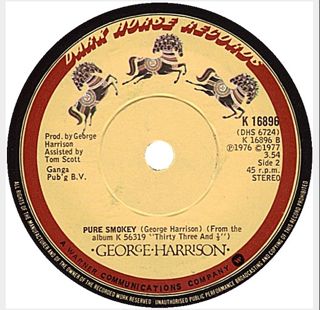
"Pure Smokey" is a song by English musician George Harrison, released in 1976 on his debut album for Dark Horse Records, Thirty Three & 1/3. The song was the second of Harrison's musical tributes to American soul singer Smokey Robinson, following "Ooh Baby " in 1975. Harrison frequently cited Robinson as one of his favourite vocalists and songwriters, and Robinson's group the Miracles had similarly influenced the Beatles during the 1960s. In the lyrics to "Pure Smokey", Harrison gives thanks for the gift of Robinson's music, while making a statement regarding the importance of expressing appreciation and gratitude, rather than forgetting to do so and later regretting it. The song title came from the name of Robinson's 1974 album Pure Smokey.

The Concert for Bangladesh is a film directed by Saul Swimmer and released in 1972. The film documents the two benefit concerts that were organised by George Harrison and Ravi Shankar to raise funds for refugees of the Bangladesh Liberation War, and were held on Sunday, 1 August 1971 at Madison Square Garden in New York City. As well as notable performances from Harrison and Shankar, the film includes "main performer" contributions from Harrison's fellow ex-Beatle Ringo Starr, Billy Preston and Leon Russell, and a surprise walk-on from Bob Dylan. Other contributing musicians include Ali Akbar Khan, Eric Clapton, the band Badfinger, Klaus Voormann, Jesse Ed Davis, Jim Horn and Jim Keltner.
"Sing One for the Lord" is a song by American soul musician Billy Preston that was released in September 1970 on his Apple Records album Encouraging Words. It was written by George Harrison and Preston. Although the pair frequently collaborated as recording artists from 1969 onwards, it is their only formal songwriting collaboration. The song is in the gospel style and was written in praise of the two musicians' respective deities.
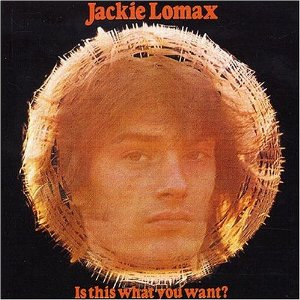
Is This What You Want? is the debut album by English rock and soul singer Jackie Lomax, released in 1969 on the Beatles' Apple record label. It was produced by George Harrison and features contributions from Harrison's Beatles bandmates Paul McCartney and Ringo Starr. The album includes Lomax's debut single for Apple, the Harrison-written "Sour Milk Sea". The US version added "New Day", which was produced by Lomax and released as a non-album single in Britain.

Doris Troy is an album released in 1970 on the Beatles' Apple Records label by American soul singer Doris Troy. It features songs written by Troy and a number of the participants on the sessions, including George Harrison, Stephen Stills, Klaus Voormann and Ringo Starr. Through the extended period of recording, the album became an all-star collaborative effort, typical of many Apple projects during 1968–70, although it was Troy's only album on the Beatles' label. Other guest musicians included Billy Preston, Peter Frampton, Leon Russell, Eric Clapton and members of the Delaney & Bonnie Friends band. Like the Harrison-produced single "Ain't That Cute", Doris Troy failed to chart in Britain or America on release.

"That's the Way God Planned It" is a song by American musician Billy Preston and the title track to his 1969 album of the same name. Issued as a single, the song was Preston's first release on the Beatles' Apple record label, following his guest role on the band's "Get Back" single. The lyrics to "That's the Way God Planned It" partly reflect the long musical apprenticeship Preston had served since childhood, mentored by artists such as Sam Cooke and Ray Charles, while musically the track combines the gospel tradition with rock. Produced by George Harrison in London, the recording also features contributions from Eric Clapton, Keith Richards, Ginger Baker and Doris Troy. Having been edited down to three minutes for its single release, the full version appeared on the album, as "That's the Way God Planned It ".

"All That I've Got (I'm Gonna Give It to You)" is a song by American soul musician Billy Preston that was released in January 1970 as his third single on Apple Records. It was written by Preston and his fellow Apple artist Doris Troy and produced by George Harrison. In the United States, the single missed the Billboard Hot 100 chart, peaking at number 108. According to Harrison, the song was Preston's musical response to criticism that he had abandoned his black soul roots by embracing rock music.
